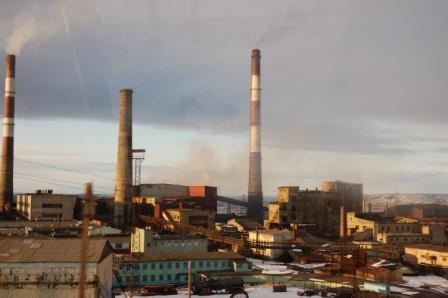
New Managing Director for Bellona Norway
The Board of the Bellona Foundation has appointed former Minister of Climate and the Environment Sveinung Rotevatn as Managing Director of Bellona No...
News

Publish date: December 5, 2016
News
Two major polluters in the Murmansk region Friday took part in a Bellona initiative to fully stop their emissions for one hour in observance of the organization’s “Zero Negative Impact on the Environment” campaign.
The initiative was introduced on December 2, 2014, by Bellona’s Murmansk office as a way to observe International Pollution Prevention day, which has taken place on the same date since 1984.
The action is aimed at short-term and voluntary full or partial suspension of industrial activities by big polluters, and has had few significant participants until this year.
On Friday, the Kola Mining and Metallurgy Company (KMMC) – a notoriously polluting daughter enterprise of giant Norilsk Nickel – shut down its nickel refining facility in the industrial city of Monchegorsk, the company said in a statement.
 Inside the smelting works in the industrial city of Nikel.
Credit: Courtesy of Vladimir Voronov
Inside the smelting works in the industrial city of Nikel.
Credit: Courtesy of Vladimir Voronov
It was joined by the Murmansk Commercial Port, which halted its cranes that load coal onto ships and which yearly coat the region in a black, hazardous dust that’s so thick it can actually be produced commercially.
That these companies throttled back their harmful emissions for an hour on Friday is a major improvement over previous years in which local industries have been invited to take part in the Bellona campaign – and refused.
Though the Apatit Mining Enterprise, the Olenogorsk Mining and Enrichment Company, and the Kola Nuclear Power plant agreed to hold lectures on the importance of environmental compliance, none of them agreed to halt their emissions.
The KMMC and the Murmansk Commercial Port’s participation is significant because for the past two years in which Bellona has invited them to participate, they have not answered.
Anna Kireeva, an adviser with Bellona’s Murmansk office, said this was the most successful of all three years during which the campaign has been held. She said that he final results of the campaign and its effectiveness would be known by December 20th.
The KMMC’s adherence to the campaign is symbolically important for Scandinavia, as the company’s nickel smelting and refining facilities release some 100,000 tons of sulfur dioxide a year, much of which falls inside Norway.
Efforts to induce the KMMC to limit its pollution since the fall of the Soviet Union have been plodding.
The company has recently promised to cut its emissions in half by 2019 through series of modernizations that are emanating from its parent company in Norilsk, in Northern Siberia. In Siberia, the industrial giant says modernization efforts will reduce its harmful emissions by 75 percent.
Kireeva, though, stopped short of saying the KMMC was turning over a new leaf because of its participation in the Bellona campaign, as most of its promises have thus far been general
“I am afraid to be optimistic, as the company has made many promises, which ended up coming to nothing,” she said. “I just hope that if they have a concrete plan they will make it public.”
The Murmansk Commercial Port has historically shipped high volumes of coal, ores, and other potentially contaminating cargoes, which contain higher than permissible concentrations of a number of metal compounds.
Its cranes load some 14 million tons of coal year round. Coal dust becomes so prevalent with the spring thaw that it can actually be raked up and sold.
Murmansk residents have for years complained to environmental authorities of coal dust sullying their windows, but little was done to improve the situation until the beginning of 2015, when central Murmansk found itself buried under an intolerable about of the black dust.
The Port Friday said in a statement that it has been using dust suppression system from Italy’s WLP dust suppression company.
The port says it’s now using the best environmental technologies, which put it in a class with its European counterparts.
This year, for the first time, the companies within the city of St Petersburg and in the Leningrad region where also asked ot participate in the campaign.

The Board of the Bellona Foundation has appointed former Minister of Climate and the Environment Sveinung Rotevatn as Managing Director of Bellona No...

Økokrim, Norway’s authority for investigating and prosecuting economic and environmental crime, has imposed a record fine on Equinor following a comp...

Our op-ed originally appeared in The Moscow Times. For more than three decades, Russia has been burdened with the remains of the Soviet ...

The United Nation’s COP30 global climate negotiations in Belém, Brazil ended this weekend with a watered-down resolution that failed to halt deforest...